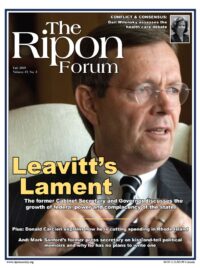 Once again, the nation is in the throes of debating health care reform. Although a perennial topic during Presidential elections, it has been a decade and a half since the country has been consumed by health care reform as a major issue — perhaps the major issue — of the day.
Once again, the nation is in the throes of debating health care reform. Although a perennial topic during Presidential elections, it has been a decade and a half since the country has been consumed by health care reform as a major issue — perhaps the major issue — of the day.
Unlike the Clinton era, with its clumsily-handled and ultimately failed Health Security Act, President Obama seems likely to be in a position to sign a health care reform bill sometime around Christmas or early in 2010.
Precisely what will be in the legislation and whether and how much Republican support will exist for the final package is yet to be determined.
Areas of Agreement
Although it is difficult to tell right now, with emotions running high and the decibels surrounding the exchanges on the floor of the Congress running higher, there actually are many areas of agreement between the parties on the need for health care reform and the general direction the reform needs to take. This was seen most clearly during the 2008 Presidential campaign but it persists now as well.
Both parties and the two Presidential candidates agreed that the rate of spending growth for health care is unsustainable and that there are serious concerns about patient safety and clinical appropriateness. These beliefs have led to agreement on the need to reform the delivery system and on many of the reforms that need to occur. These reforms include the importance of changing how physicians and hospitals are paid so as to promote care coordination and quality, the need to promote preventive care and chronic disease management, the importance of encouraging the use of electronic medical records and other forms of health IT, and encouraging the faster introduction of generic drugs.
There has even been agreement on the importance of expanding subsidies to buy insurance coverage, especially to people who are not currently subsidized, and also the need to make provisions for people who are identifiably high-risk health care spenders.
Areas of Disagreement
While the principles and, in some cases, even some of the policies are similar (such as the importance of moving away from individual fee for service payments towards more bundled payments, and payments to more accountable units) many of the policies and some of the basic principles are clearly different between the parties, especially as they are now being articulated by the respective leaders in the Congress.
The importance of liability reform and the prominence given to reforming the tort system is and has been a major area of disagreement between Republicans and Democrats. During the campaigns, there had been some discussion by Democrats about linking medical error disclosure with physician liability protections or at least promoting new models for addressing physician errors and generally referencing the need to reform malpractice. But since then, there has been almost no attention given to the issue in the various proposals under consideration.
Republicans, both during the campaign and now, put it at the top of their list of cost containment strategies. Given the current focus on the importance of incentives that reward physicians and institutions that “do less,” providing them with liability protection in exchange for practicing within clinical guidelines and safety protocols seems crucial. The possibility of allowing the Health and Human Services Secretary to develop state pilots, which the President referenced in his September speech to Congress, is no substitute for change in current law.
The strategies that are being proposed subsidize coverage, and the regulatory structures surrounding them are also very different. Many Republicans, including Senator John McCain, have proposed substituting a refundable credit for the current tax exclusion for employer sponsored insurance. This has been done both as a way of ending the discrimination against people who are not offered employer-sponsored insurance and as a means to encourage people to be more cost conscious about the insurance they choose.
…it’s important to recognize the political dilemma that Republicans face.
Democrats have primarily relied on Medicaid expansions to cover the poor; others up to 400 percent of the poverty line would receive subsidies to purchase insurance through insurance exchanges. Initially, the Finance Committee bill proposed to allow people above the poverty line who were eligible for Medicaid to use the equivalent funds to purchase private insurance through the insurance exchanges. But this provision was removed before the final committee vote.
The type of insurance, and where and how people purchase insurance, is also very different. Republicans have promoted the purchase of insurance across state lines as a strategy that would increase the availability of insurance offerings and also allow purchasers to avoid state mandates. This move to the increased use of individually purchased insurance has raised some questions about how to compensate for people who are predictably at risk for high spending, which has led to the proposal for subsidized state high risk pools.
Democrats — and some Republicans — have relied on insurance exchanges as a strategy to pool risks and better promote competition on the basis of price and quality. The amount of regulation that is used in structuring the exchanges, particularly regarding what types of insurance products can be offered and if/how prices can vary for different age groups or other characteristics, has been the subject of debate.
The Obstacles to Reform
There are substantive as well as political obstacles to achieving health care reform. Some of the most important substantive differences are described above. Perhaps the biggest obstacle, though, is the lack of agreement on how to pay for coverage expansions.
There is wide-spread agreement that any expansions in insurance coverage need to be financed. Both parties have agreed that the financial bail-out last year and the stimulus package enacted early in 2009 prohibit the use of any further deficit financing. Whether to finance the expansions from new taxes — particularly those on higher income individuals and health care providers — as opposed to squeezing money out of health care is one important area of disagreement. But Congressional Republicans have also been sharply critical of proposals to slow spending under Medicare. This may however, largely reflect the other disagreements, and be more negotiable if there was more agreement on what was being financed.
Since what emerges from conference is likely to be more liberal than the Senate bill that goes in, Republicans who support it will have helped make possible the passage of a bill they may like a lot less but will not be able to stop.
Finally, it’s important to recognize the political dilemma that Republicans face. Among the various bills being considered, the Senate Finance Committee bill is the most moderate. It will be merged with the Health, Education, Labor and Pension Committee bill, and then voted on by the full Senate. While the merged bill is likely to look a lot like the Finance Committee bill in terms of controversial provisions, once the bill goes into conference, there will be little that Republicans can do to affect the outcome.
Since what emerges from conference is likely to be more liberal than the Senate bill that goes in, Republicans who support it will have helped make possible the passage of a bill they may like a lot less but will not be able to stop.
Despite that knowledge, several prominent Republicans — like former Senators Dole and Frist, and current governors like Schwarzenegger and Jindal – have been calling on their colleagues to participate in health care reform.
We will know before too long whether these calls will be heeded and whether President Obama will succeed in his bid for reform.
Gail Wilensky is an economist and a senior fellow at Project HOPE, an international health education foundation. She served as Administrator of the Health Care Financing Administration from 1990 to 1992 and the chair of the Medicare Payment Advisory Commission from 1997 to 2001.




